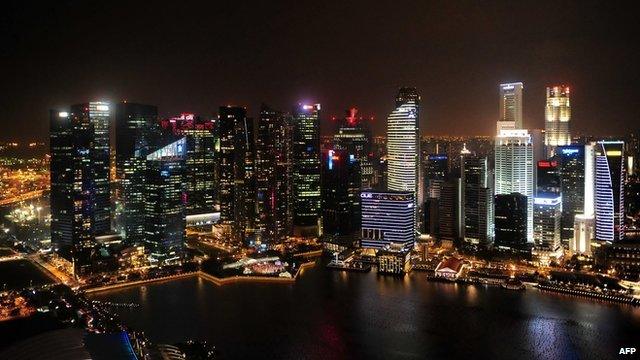How Lee Kuan Yew engineered Singapore's economic miracle
- Published
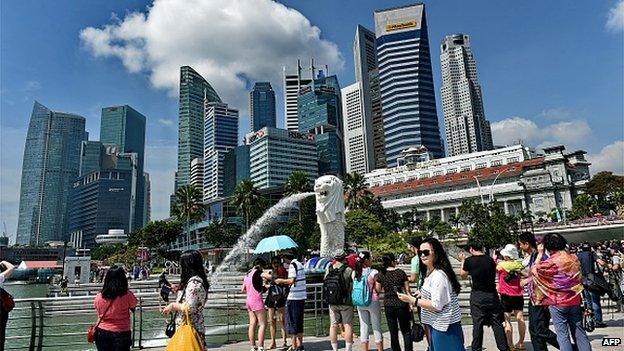
Lee Kuan Yew was the world's longest serving prime minister
At one degree north of the equator, tropical Singapore has become a hotspot known for its efficient infrastructure, rooftop bars, chilli crab, and host city to the only night race on the Formula 1 racing calendar.
Often dubbed as the "Monaco of the East", the red dot has beaten a path to steady economic progress and prosperity since the 1970s.
Much of the city's success can be attributed to the vision of one man - Lee Kuan Yew, Singapore's first prime minister who died this week. He was in office from 1959 to 1990.
The tenure made him the world's longest-serving prime minister in history. Singapore broke away from neighbouring Malaysia and gained independence in 1965.
About half a century ago, Singapore was an island without any natural resources to call its own.
Since then, it has pulled off a dramatic transformation - boasting two casino-integrated resorts and an airport that has frequently topped the "world's best" list.
In addition, the central business district is crowded with skyscrapers that rival neighbouring Hong Kong and mid-town Manhattan in far-flung New York.
Mr Lee was not one to shy away from his achievements for Singapore. The second volume of his published memoirs carries the title, From Third World to First: The Singapore Story: 1965-2000.
To help sum up his economic triumphs for the city state, several experts shared their views on Lee Kuan Yew's economic legacies for Singapore.

THE LEGACY

Attractive destination
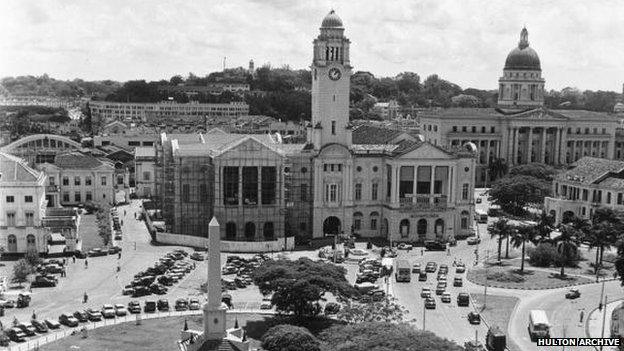
Singapore became an independent nation in 1965 after breaking away from Malaysia
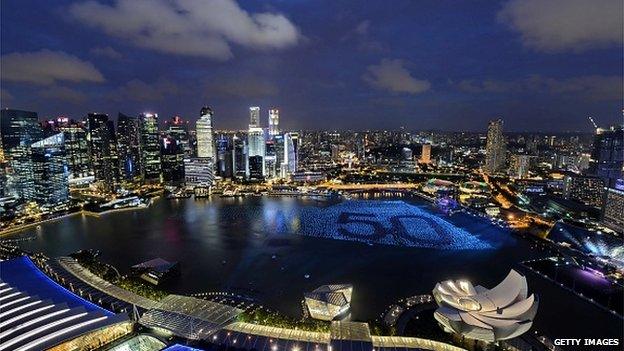
Since then it has beaten a steady path to economic progress and prosperity
Navnita Sarma, Asia editor, Economist Intelligence Unit
Lee Kuan Yew's emphasis on growth, the thrust on making Singapore attractive as a destination for investment as well as the focus on drawing world class manpower; building state of the art infrastructure and excellent air and sea linkages; a low and transparent tax regime; clean and efficient bureaucracy; a strong regulatory and legal framework; a neutral diplomatic policy which has ensured it is an ally of the US as well as China; and developing a clean and green city, have ensured Singapore's stupendous economic success.
These factors have led to the emergence of Singapore as a powerful and wealthy financial centre.

Legacy of a luminary
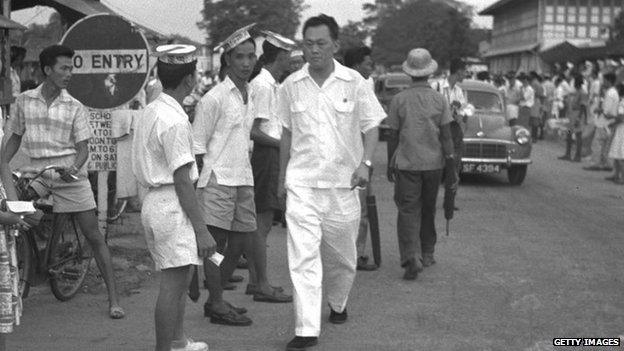
Lee on the campaign trail in 1958
Vishnu Varathan, senior economist, Mizuho Bank
A trained lawyer, this visionary leader was Singapore's chief architect in harnessing social cohesion despite ethnic and religious diversity; and in engineering an economic miracle.
His defining economic policy is arguably uncompromising standards for a universally accessible, top-flight public education system - astutely identifying human capital as Singapore's key competitive advantage - supplemented with rigorous application of meritocracy.
This understated principle accelerated economic ascendancy by unleashing the forces of upward social mobility for all, with little tolerance for complacency or corruption. Complemented by a fair and transparent judiciary, businesses thrived.
But above all, Mr Lee's principled approach to nation building forged his legacy as a luminary.

Unparalleled set-up
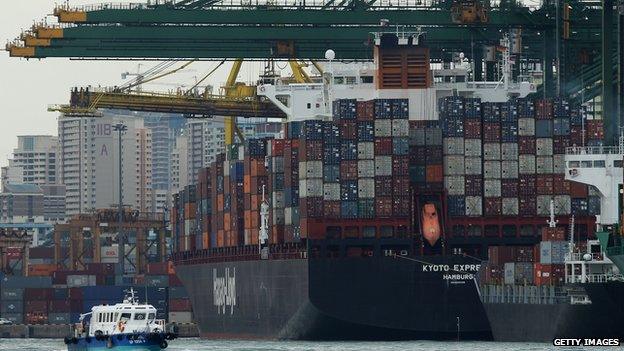
Singapore currently has the world's second busiest port after China's Shanghai
Professor Ilian Milhov, dean, INSEAD
Lee Kuan Yew performed a miracle transforming Singapore from one of the poorest countries in the world in the 1960s to being among the most advanced today.
His main contribution, and the key to his success, was that he understood that in order to put Singapore on a sustainable growth trajectory one needs much more than sound economic policy.
Any policy can be reversed, any incentives for growth can be dismantled. Mr Lee built a country whose institutional set-up is unparalleled.
This includes the rule of law; efficient government structures; the continuous fight against corruption; and overall stability.

Immigrant integration
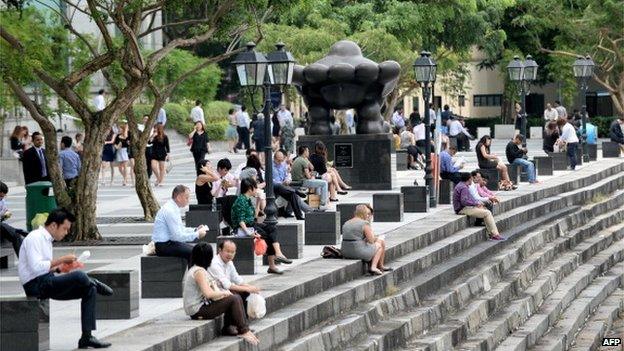
Singapore's 5.5 million population includes 1.6 million non-residents
David Kuo, chief executive, The Motley Fool Singapore
Lee Kuan Yew's vision was to build an economically sound country that would be robust enough for future generations. But he knew Singapore had limitations.
To achieve his dream, he had to change the mindset of its then population of around two million people. Singaporeans had to be more welcoming to immigrants if the country were to grow.
The population needed to expand by continually attracting high-calibre people who would create employment, bring in much-needed capital and most importantly, pass on their key skills.
It is thanks to Lee Kuan Yew's vision that Singapore is as welcoming to immigrants today as it was 50 years ago.
But it is the integration of foreign and home-grown talent that has allowed the country to enjoy decades of economic growth.
The economic value of every person in Singapore today is as high as that of the US.

Regional hub
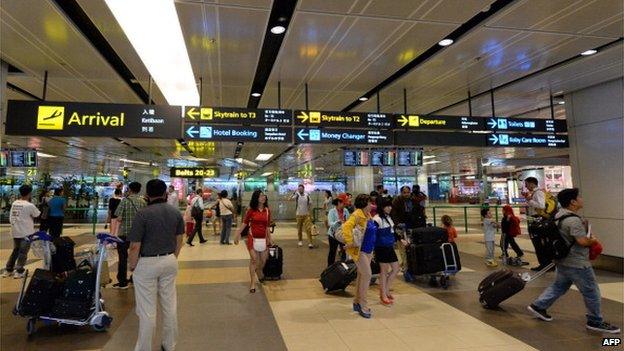
Singapore's Changi Airport has frequently won top honours as the world's best airport
Tony Nash, global vice president, Delta Economics
After the separation from Malaysia, Lee Kuan Yew developed a highly technocratic government which led to competitive, meritocratic and results-based economic policies.
Some key decisions were the development of Changi Airport as a regional transport hub after Singapore outgrew the previous Paya Lebar airport, which was a state-of-the-art facility when it opened in the 1950s.
The air hub and the aggressive defence of Singapore as a sea freight trans-shipment hub - as well as the technocratic foundations of transparency and good governance - led to Singapore's position as a natural hub for multinational businesses in Asia.
Other key positive economic policies included the Central Provident Fund, Housing Development Board flat ownership and integrated education, which all helped Singapore transition from a village setting towards towns and the highly sophisticated cosmopolitan global city we see today.
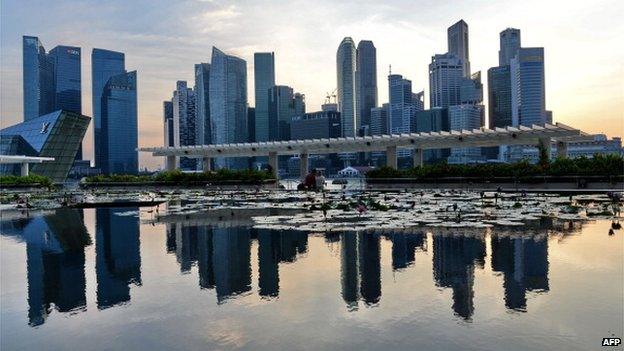
Singapore's annual growth rate averaged 6.81% from 1976 until 2014

THE FUTURE

With such high praises, what does the future hold for Singapore?
Can it sustain the pace of development amid the current economic turbulence in Europe and while America is still finding its footing for growth?
While some see continued success, others are warning of a changing landscape.

Bright outlook
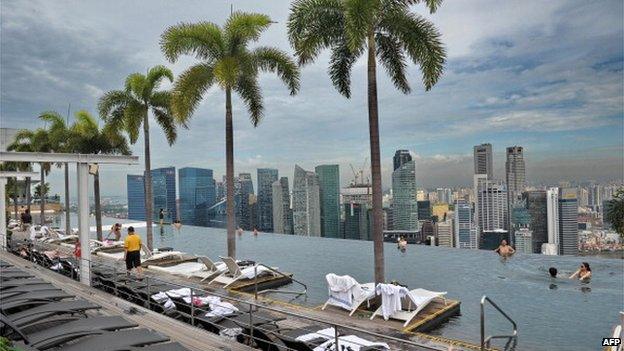
More than 15 million international visitors came to Singapore last year
Rajiv Biswas, Asia Pacific chief economist, IHS
Singapore is one of the most competitive economies in the world today.
In order to maintain rising wages and improving living standards, Singapore will continue to transform its economy towards higher-value-added industries with strong productivity growth.
Key growth drivers for Singapore over the next decade will be Singapore's role as one of the world's leading financial centres; its competitiveness as a logistics, shipping and aviation hub; and its role as a regional HQ for global multinationals.
The long-term outlook for Singapore remains very bright.

Finding balance
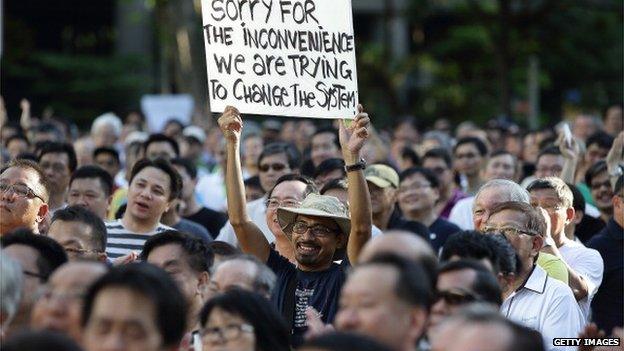
Public protests have been rare in Singapore
Navnita Sarma, Asia editor, Economist Intelligence Unit
There are downside risks to growth which stem from rising income inequality and restrictions on free speech.
There is an attempt to widen the social security net, which could partially ease signs of unrest in a local population grappling with the high cost of living.
The government will have to strike a fine balance between being fiscally prudent and expanding welfare schemes, in order to retain its high sovereign ratings.
A population that is social media savvy is also more politically engaged and this will mean that a higher proportion of younger voters will demand the right to dissent.

Changing circumstances

With high unemployment and a housing shortage in the 1960s, many were doubtful of Singapore's prospects
Michael Barr, associate professor, Flinders University, Australia
Gradually, the political system and the economic regime put in place by Lee Kuan Yew will unwind and become less and less effective.
This is partly because of changing circumstances over which Singapore has no or little control, but also because Lee has left in place a broken system of elite regeneration.
In short, his system only works with someone as smart and ruthless as Lee Kuan Yew at the top.
My fear is that his successors might be able to bring themselves to be as ruthless as Lee, but not as smart. This would be the worst of all worlds.
A better scenario would see a more flexible and open political system that is less ruthless and has much more public accountability.
- Published28 February 2015
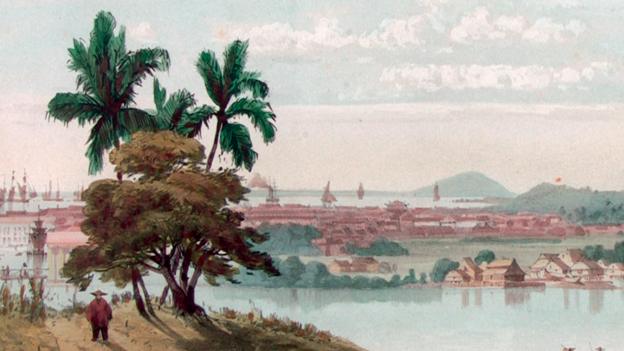
- Published22 March 2015
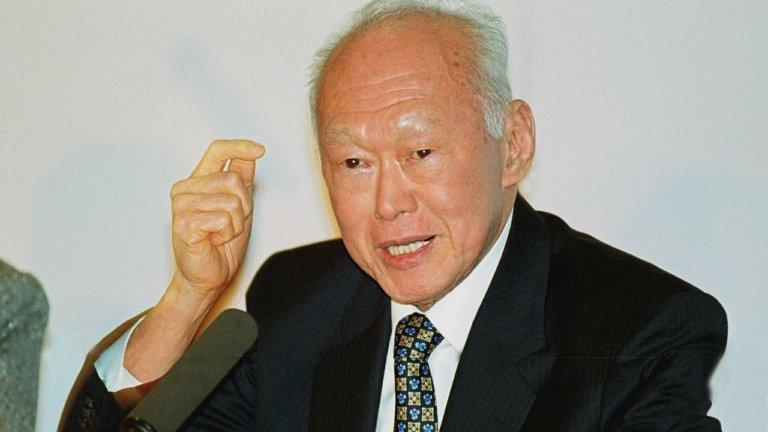
- Published23 March 2015
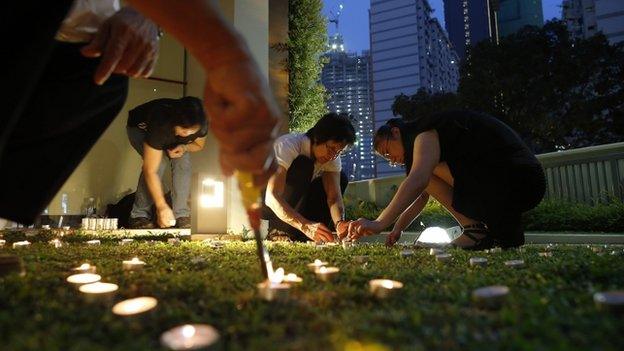
- Published22 March 2015
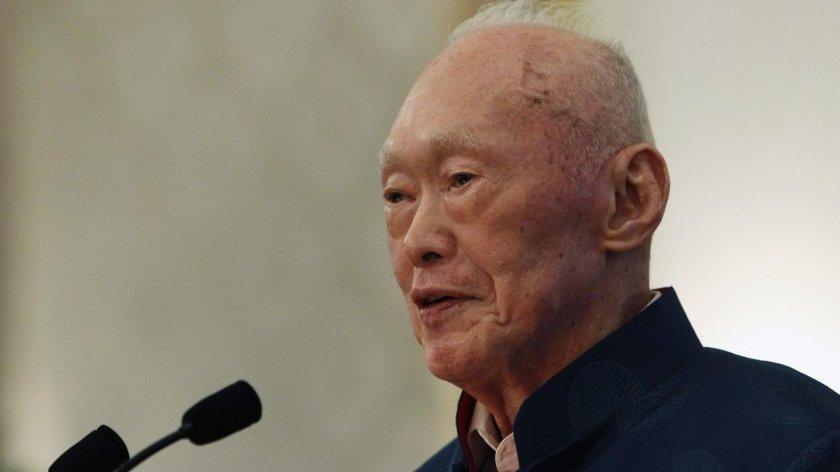
- Published23 March 2015
